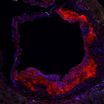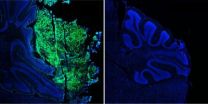(Press-News.org) People with diabetes often develop clogged arteries that cause heart disease, and new research at Washington University School of Medicine in St. Louis suggests that low vitamin D levels are to blame.
In a study published Nov. 9 in the Journal of Biological Chemistry, the researchers report that blood vessels are less like to clog in people with diabetes who get adequate vitamin D. But in patients with insufficient vitamin D, immune cells bind to blood vessels near the heart, then trap cholesterol to block those blood vessels.
"About 26 million Americans now have type 2 diabetes," says principal investigator Carlos Bernal-Mizrachi, MD. "And as obesity rates rise, we expect even more people will develop diabetes. Those patients are more likely to experience heart problems due to an increase in vascular inflammation, so we have been investigating why this occurs."
In earlier research, Bernal-Mizrachi, an assistant professor of medicine and of cell biology and physiology, and his colleagues found that vitamin D appears to play a key role in heart disease. This new study takes their work a step further, suggesting that when vitamin D levels are low, a particular class of white blood cell is more likely to adhere to cells in the walls of blood vessels.
Vitamin D conspires with immune cells called macrophages either to keep arteries clear or to clog them. The macrophages begin their existence as white blood cells called monocytes that circulate in the bloodstream. But when monocytes encounter inflammation, they are transformed into macrophages, which no longer circulate.
In the new study, researchers looked at vitamin D levels in 43 people with type 2 diabetes and in 25 others who were similar in age, sex and body weight but didn't have diabetes.
They found that in diabetes patients with low vitamin D — less than 30 nanograms per milliliter of blood — the macrophage cells were more likely to adhere to the walls of blood vessels, which triggers cells to get loaded with cholesterol, eventually causing the vessels to stiffen and block blood flow.
"We took everything into account," says first author Amy E. Riek, MD, instructor in medicine. "We looked at blood pressure, cholesterol, diabetes control, body weight and race. But only vitamin D levels correlated to whether these cells stuck to the blood vessel wall."
Riek and Bernal-Mizrachi say what's not yet clear is whether giving vitamin D to people with diabetes will reverse their risk of developing clogged arteries, a condition called atherosclerosis. They now are treating mice with vitamin D to see whether it can prevent monocytes from adhering to the walls of blood vessels near the heart, and they also are conducting two clinical trials in patients.
In one of those studies, the researchers are giving vitamin D to people with diabetes and hypertension to see whether the treatment may lower blood pressure. In the second study, African Americans with type 2 diabetes are getting vitamin D along with their other daily medications, and the research team is evaluating whether vitamin D supplements can slow or reverse the progression of heart disease.
Sometime in the next several months, the scientists hope to determine whether vitamin D treatment can reverse some of the risk factors associated with cardiovascular disease.
"In the future, we hope to generate medications, potentially even vitamin D itself, that help prevent the deposit of cholesterol in the blood vessels," Bernal-Mizrachi explains. "Previous studies have linked vitamin D deficiency in these patients to increases in cardiovascular disease and in mortality. Other work has suggested that vitamin D may improve insulin release from the pancreas and insulin sensitivity. Our ultimate goal is to intervene in people with diabetes and to see whether vitamin D might decrease inflammation, reduce blood pressure and lessen the likelihood that they will develop atherosclerosis or other vascular complications."
INFORMATION:
AUDIO:
Heart disease is one of the most common, and most deadly, complications faced by people with type 2 diabetes. they can develop clogged arteries, and now researchers at Washington University...
Click here for more information.
Riek AE, Sprague JE, Timpson A, de las Fuentes L, Bernal-Mizrachi L, Schechtman KB, Bernal-Mizrachi C. Vitamin D suppression of endoplasmic reticulum stress promotes an anti-atherogenic monocyte/macrophage phenotype in type 2 diabetic patients. Journal of Biological Chemistry vol. 287 (46), pp. 38482-38494. Nov. 9, 2012
http://www.jbc.org/cgi/doi/10.1074/jbc.M112.386912
Funding for this research comes from the National Heart, Lung and Blood Institute (NHLBI), National Institute of Diabetes and Digestive and Kidney Diseases (NIDDK), Eunice Kennedy Shriver National Institute of Child Health and Human Development (NICHD), National Center for Research Resources (NCRR), National Center for Advancing Translational Sciences (NCATS), and NIH Roadmap for Medical Research of the National Institutes of Health (NIH). Support also comes from the American Diabetes Association, the Endocrine Society, the Endocrine Fellows Foundation and the Ruth L. Kirchstein National Research Service Award 2. NIH grant numbers are RO1 HO094818-0, P30DK079333, T32 HD043010, and UL1TRR000448/Sub-Award KL2TR000450.
Washington University School of Medicine's 2,100 employed and volunteer faculty physicians also are the medical staff of Barnes-Jewish and St. Louis Children's hospitals. The School of Medicine is one of the leading medical research, teaching and patient care institutions in the nation, currently ranked sixth in the nation by U.S. News & World Report. Through its affiliations with Barnes-Jewish and St. Louis Children's hospitals, the School of Medicine is linked to BJC HealthCare.
Vitamin D may prevent clogged arteries in diabetics
2012-11-14
ELSE PRESS RELEASES FROM THIS DATE:
Being neurotic, and conscientious, a good combo for health
2012-11-14
Under certain circumstances neuroticism can be good for your health, according to a University of Rochester Medical Center study showing that some self-described neurotics also tended to have the lowest levels of Interleukin 6 (IL-6), a biomarker for inflammation and chronic disease.
Researchers made the preliminary discovery while conducting research into how psychosocial factors such as personality traits influence underlying biology, to predict harmful conditions like inflammation.
Known as one of the "Big 5" traits, neuroticism is usually marked by being moody, nervous, ...
Research strengthens link between obesity and dental health in homeless children
2012-11-14
Obesity and dental cavities increase and become epidemic as children living below the poverty level age, according to nurse researchers from the Case Western Reserve University and the University of Akron.
"It's the leading cause of chronic infections in children," said Marguerite DiMarco, associate professor at the Frances Payne Bolton School of Nursing at Case Western Reserve University.
Researchers Sheau-Huey Chiu, assistant professor, and graduate assistant Jessica L. Prokp, from the University of Akron's College of Nursing, contributed to the study.
Researchers ...
For brain tumors, origins matter
2012-11-14
Cancers arise when a normal cell acquires a mutation in a gene that regulates cellular growth or survival. But the particular cell this mutation happens in—the cell of origin—can have an enormous impact on the behavior of the tumor, and on the strategies used to treat it.
Robert Wechsler-Reya, Ph.D., professor and program director at Sanford-Burnham Medical Research Institute, and his team study medulloblastoma, the most common malignant brain cancer in children. A few years ago, they made an important discovery: medulloblastoma can originate from one of two cell types: ...
Stem cell finding could advance immunotherapy for lung cancer
2012-11-14
CINCINNATI—A University of Cincinnati (UC) Cancer Institute lung cancer research team reports that lung cancer stem cells can be isolated—and then grown—in a preclinical model, offering a new avenue for investigating immunotherapy treatment options that specifically target stem cells.
John C. Morris, MD, and his colleagues report their findings in the Nov. 13, 2012, issue of PLOS One, a peer-reviewed online publication that features original research from all disciplines within science and medicine.
Stem cells are unique cells that can divide and differentiate into ...
New type of bacterial protection found within cells
2012-11-14
Irvine, Calif., Nov. 13, 2012 — UC Irvine biologists have discovered that fats within cells store a class of proteins with potent antibacterial activity, revealing a previously unknown type of immune system response that targets and kills bacterial infections.
Steven Gross, UCI professor of developmental & cell biology, and colleagues identified this novel intercellular role of histone proteins in fruit flies, and it could herald a new approach to fighting bacterial growth within cells. The study appears today in eLife, a new peer-reviewed, open-access journal supported ...
Uranium exposure linked to increased lupus rate
2012-11-14
CINCINNATI—People living near a former uranium ore processing facility in Ohio are experiencing a higher than average rate of lupus, according a new study conducted by scientists at the University of Cincinnati and Cincinnati Children's Hospital Medical Center.
Lupus is a chronic inflammatory disease that can affect the skin, joints, kidneys, lungs, nervous system and other organs of the body. The underlying causes of lupus are unknown, but it is usually more common in women of child-bearing age.
For this new study, a collaborative team of UC and Cincinnati Children's ...
Less of a shock
2012-11-14
Implantable defibrillators currently on the market apply between 600 and 900 volts to the heart, almost 10 times the voltage from an electric outlet, says Ajit H. Janardhan, MD, PhD, a cardiac electrophysiology fellow at the Washington University's School of Medicine.
After being shocked, he says, some patients get post-traumatic stress disorder. Patients may even go so far as to ask their physicians to remove the defibrillator, even though they understand that the device has saved their lives.
The huge shocks are not only unbearably painful, they damage the heart muscle ...
The road to language learning is iconic
2012-11-14
Languages are highly complex systems and yet most children seem to acquire language easily, even in the absence of formal instruction. New research on young children's use of British Sign Language (BSL) sheds light on one of the mechanisms - iconicity - that may endow children with this amazing ability.
For spoken and written language, the arbitrary relationship between a word's form – how it sounds or how it looks on paper – and its meaning is a particularly challenging feature of language acquisition. But one of the first things people notice about sign languages is ...
State of Nuevo León first to benefit from improved nationwide air quality information system
2012-11-14
This press release is available in Spanish and French.
Monterrey, 13 November 2012—Today, the Nuevo León state ministry of sustainable development, with support from the Commission for Environmental Cooperation (CEC), launched a revamped air quality information management system in Monterrey, Mexico, using AirNow-International.
This CEC initiative, developed in coordination with Canadian, Mexican and US government agencies, is laying the foundation for improved ways to inform citizens around the country about air quality in their communities with real-time data that ...
NASA sees sun emit a mid-level flare
2012-11-14
On Nov. 13, 2012, the sun emitted a mid-level solar flare, peaking at 9:04 p.m. EST.
Solar flares are powerful bursts of radiation. Harmful radiation from a flare cannot pass through Earth's atmosphere to physically affect humans on the ground, however -- when intense enough -- they can disturb the atmosphere in the layer where Global Positioning System (GPS) and communications signals travel. This disrupts the radio signals for as long as the flare is ongoing, anywhere from minutes to hours.
This flare is classified as an M6 flare. M-class flares are the weakest flares ...



